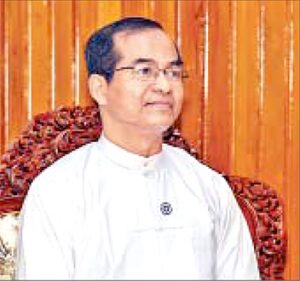With other countries in the region having better wages due to their higher economic development and advanced communication technologies contributing to their social networking platforms, an increasing number of Myanmar citizens are searching for jobs overseas.
The following is an interview with U Win Shein, the Director-General of the Department of Labour, where we cover his department’s tasks in ensuring the rights of Myanmar’s migrant workers.
Q: Could you tell us what are the leading factors causing people to find employment overseas?
U Win Shein: Migration has become an important aspect of today’s world as people search for better income, higher living standards and more fulfillment in their lives.
While there are numerous advantages to working abroad, there are a variety of challenges and hurdles as well. These advantages include those that benefit the individual, such as a wider range of employment choices and sufficient income, and those that benefit their home country, such as raising national GDP through sending money back to one’s family, thus collectively providing social security to the family.
But the pitfalls of migrant workers are the dangers of being trafficked, having your wages cut through brokers, lack of security and having to work in hazardous conditions.
Only a few people who are either professional in a certain field or skilled technicians are capable of finding work in developed countries, such as Japan or Singapore. The rest who have average or below the necessary skill level go to Thailand, Malaysia and South Korea for work.
Q: Could you give us an update on the progress of ensuring the migrant workers have full rights and protection.
U Win Shein: The Union Government has enacted migrant worker policies and is conducting prioritized management tasks concerning their welfare. They’re also revising or legislating laws that reflect the requirements of the current situation and negotiating with relevant countries on these matters.
We have appointed five labour attachés in Thailand, two in Malaysia and one in South Korea to ensure our citizens receive the full rights of the respective country’s labour laws, can work in relative safety, and are protected from human trafficking.
In the countries we’re unable to send labour attachés, we coordinate with the Myanmar embassy there for these matters.
To give an overview, we are helping our citizens working in Thailand through the guidance of the Ambassador there and in cooperation between the five labour attachés and CSOs like FED, MWRN, JACBA and the Myanmar Overseas Employment Agencies Federation (MOEAF).
Myanmar workers who have applied for social welfare in Thailand can receive medical treatment at any government clinic or hospital there, in addition to other rights outlined in their social welfare law.
Social welfare does not cover those working in the agriculture and fishery sectors nor for domestic helpers, so they have to purchase hospital cards but they will still receive the same medical treatments.
Our citizens can also contact the Migrant Resource Center (MRC), Department of Labour and employment offices in their respective state or region to ask about the essential facts of the country they are going to work in or to consult on difficulties they are facing.
They can also contact the department’s Facebook page, ‘Safe Migration’ or contact the complaint mechanisms in Nay Pyi Taw (067-430184, 067-430284), Yangon (01-650089, 01-650187) or the migrant worker branch department (067-430183, 067-430185).
They can also contact the Myanmar embassies and labour attachés in Thailand, Malaysia and South Korea through via their phone number, Viber and Line accounts.
Q: Could you please elaborate on what you have done for the Myanmar workers in Thailand.
U Win Shein: We opened temporary visa centers for undocumented Myanmar workers in Thailand from 2009 to July 2013 and helped 1,680,556 workers get fully documented.
On 10 March 2014, we helped workers who have finished their four-year entry visa, have the necessary citizenship documents and used up their temporary visas by opening an ordinary passport issuing office at the Myanmar embassy in Bangkok. We have issued ordinary visas for 88,285 workers as of 31 May 2019.
The office issued ordinary visas for 125,799 Myanmar workers with both the necessary citizenship documents and the Thai government-issued TR-38 temporary residential card between 10 March 2014 to 31 May 2019.
We opened One Stop Service Centers in Mai Sei, Maw Sot, and Ranong on 10 March 2014 for Myanmar workers who still had valid temporary visas to have their work permit extended. When the center was closed on 30 June 2016, it had helped 575,544 workers.
We opened a Temporary Data Collection Center at the ordinary passport issuance center in Samut Sakon province on 15 March this year, as it has the highest concentration of Myanmar workers there.
Our two countries have also negotiated and opened nine centers in Samut Sakon 1 and 2, Samut Prakan, Mae Sei, Mae Sot, Ranong, Chiang Mai, Nakhon Sawan and Saung Kalaw. We have sent mobile teams to areas with the highest number of Myanmar workers and issued certificates of identity (CI) to them. We have issued 1,099,586 Cis between 3 March 2017 to 30 June 2018.
To be continued
Translated by Pen Dali



